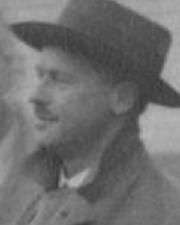Ludwig Bieberbach
| Ludwig Bieberbach | |
|---|---|
|
1930 at Jena | |
| Born |
4 December 1886 Goddelau, Grand Duchy of Hesse, German Empire |
| Died |
1 September 1982 (aged 95) Oberaudorf, Upper Bavaria, West Germany |
| Nationality | German |
| Fields | Mathematics |
| Institutions |
University of Berlin University of Frankfurt |
| Alma mater |
University of Göttingen University of Heidelberg |
| Doctoral advisor | Felix Klein |
| Doctoral students |
Hubert Cremer Werner Fenchel Maximilian Herzberger Heinz Hopf Kurt Schröder Wilhelm Süss |
| Known for | Fatou–Bieberbach domain |
Ludwig Georg Elias Moses Bieberbach (German: [ˈbiːbɐˌbaχ]; 4 December 1886 – 1 September 1982) was a German mathematician.[1]
Biography
Born in Goddelau, near Darmstadt, he studied at Heidelberg and under Felix Klein at Göttingen, receiving his doctorate in 1910.[2] His dissertation was titled On the theory of automorphic functions (German: Theorie der automorphen Funktionen). He began working as a Privatdozent at Königsberg in 1910 and as Professor ordinarius at the University of Basel in 1913. He taught at the University of Frankfurt in 1915 and the University of Berlin from 1921–45.
Bieberbach wrote a habilitation thesis in 1911 about groups of Euclidean motions – identifying conditions under which the group must have a translational subgroup whose vectors span the Euclidean space – that helped solve Hilbert's 18th problem. He worked on complex analysis and its applications to other areas in mathematics. He is known for his work on dynamics in several complex variables, where he obtained results similar to Fatou's. In 1916 he formulated the Bieberbach conjecture, stating a necessary condition for a holomorphic function to map the open unit disc injectively into the complex plane in terms of the function's Taylor series. In 1984 Louis de Branges proved the conjecture (for this reason, the Bieberbach conjecture is sometimes called de Branges' theorem). There is also a Bieberbach theorem on space groups. In 1928 Bieberbach wrote a book with Issai Schur titled Über die Minkowskische Reduktiontheorie der positiven quadratischen Formen.
Bieberbach was a speaker at the International Congress of Mathematicians held at Zurich in 1932.
Politics
Bieberbach joined the Sturmabteilung in 1933 and the NSDAP in 1937. He was enthusiastically involved in the efforts to dismiss his Jewish colleagues, including Edmund Landau and his former coauthor Schur, from their posts. Bieberbach was heavily influenced by Theodore Vahlen, another German mathematician and anti-Semite, who along with Bieberbach founded the "Deutsche Mathematik" ("German mathematics") movement and journal of the same name. The purpose of the movement was to encourage and promote a "German" (in this case meaning intuitionistic) style in mathematics. Bieberbach's and Vahlen's idea of having German mathematics was only part of a wider trend in the scientific community in Nazi Germany towards giving the sciences racial character; there were also pseudoscientific movements for "Deutsche Physik", "German chemistry", and "German biology". In 1945, Bieberbach was dismissed from all his academic positions because of his support of Nazism, but in 1949 was invited to lecture at the University of Basel by Ostrowski, who considered Bieberbach's political views irrelevant to his contributions to the field of mathematics.[3]
Quotation
"… the spatial imagination is a characteristic of the Germanic races, while pure logical reasoning has a richer development among Romanic and Hebraic races. … In the intellectual sphere the race shows in the manner of creation, the evaluation of the results, and I guess also in the standpoint considering foundational questions. … Formalism wants to build a realm of mathematical truths which is independent of man, whereas Intuitionism is based on the idea that mathematical thinking is a human endeavor and thus cannot be separated from man." (in Stilarten mathematischen Schaffens, i.e. Styles of mathematical creation/endeavour, p. 357).
See also
External links
- Author profile in the database zbMATH
References
- ↑ O'Connor, John J.; Robertson, Edmund F., "Ludwig Bieberbach", MacTutor History of Mathematics archive, University of St Andrews.
- ↑ Ludwig Bieberbach at the Mathematics Genealogy Project
- ↑ Gautschi, Walter (2010), "Alexander M. Ostrowski (1893–1986): His life, work, and students" (PDF), math.ch/100: Swiss Mathematical Society, 1910–2010, Zürich: European Mathematical Society Publishing House, pp. 257–278. See in particular p. 263: "This high esteem of scientific merits, regardless of political, personal, or other shortcomings of this attaining them, came across already in 1949, when he [Ostrowski] had the courage of inviting Bieberbach – then disgraced by his Nazi past and ostracized by the European intelligentsia – to spend a semester as guest of the university of Basel and conduct a seminar on geometric constructions."
Further reading
- Cornwell, John (2003), Hitler's Scientist: Science, War and the Devil's Pact, New York: Penguin Books, ISBN 0-14-200480-4
- Mehrtens, Herbert (1987), "Ludwig Bieberbach and "Deutsche Mathematik"", in Phillips, Esther R., Studies in the history of mathematics, MAA Stud. Math., 26, Washington, DC: Math. Assoc. America, pp. 195–241, ISBN 978-0-88385-128-9, MR 913104
- Segal, Sanford L. (2003), "Chapter seven: Ludwig Bieberbach and Deutsche Mathematik", Mathematicians under the Nazis, Princeton University Press, pp. 334–418, ISBN 978-0-691-00451-8, MR 1991149
